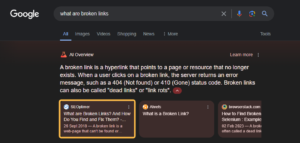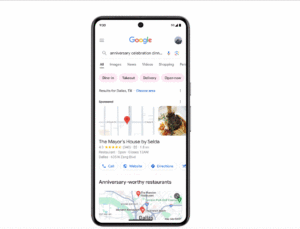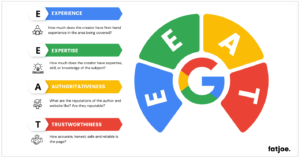Why do Google’s latest updates call for Smart SEO and Content Marketing?

SEO in the AI-Driven Era
Google introduced a major update on May 24, changing how SERPs are displayed for all your search quests. Leading search engine players like Google and Bing have started showing AI-driven summaries for your search inquiries. Following the footsteps, Open AI intends to release Search GPT for fast and timely answers from clear and relevant sources on the web.
These technology updates in today’s AI-driven era pose a specific challenge to regular SEO specialists. They need help ranking their websites on top pages, and traditional SEO techniques are no longer very effective. This concern is shared by all website owners and agencies, who wonder if it is possible to optimize for these AI-generated responses by search engines. Traditional SEO is now evolving into GEO, or Generative Engine Optimisation—the new name of the SEO game in the AI-driven era.
Concerns Of the SEO Specialists and Website Owners Today
Ranking Fluctuations:
After search engines introduced AI in their search results models, SEO agencies and website owners worldwide reported a sharp decline in page rankings. Traditional SEO specialists have yet to find appropriate SEO strategies and solutions regarding AI’s different criteria and methods for evaluating content that aligns with AI’s search preference.
Transparency and Impact on Your Page Traffic
SEO specialists face the major challenge of ensuring transparency and understanding of the new AI model’s functioning. Sudden changes in page ranking can significantly impact page traffic and organic lead generation, leading to client dissatisfaction.
AI Search Model’s Functioning
It takes time to understand how a new AI algorithm works. There may be biases within AI models that favor certain types of content and its sources over others. At this stage, you have no choice but to wait for the search engine’s tutorials about it a few months later. The concept of GEO, or Generative Engine Optimization, is evolving here, which is the future of SEO.
What is GEO or Generative Engine Optimisation?

GEO is a new SEO strategy that offers hope in the face of AI dominance. It optimizes web content for generative AI platforms, ensuring high-quality, contextually relevant, easy-to-understand content and accessibility by AI search models. This increases its likelihood of being prioritized and presents some solutions to the challenges posed by AI-driven search updates.
As we all know, Google recently introduced a new generative AI for the search feature, powered by its AI model Gemini. Instead of traditional search results, online readers will see the new search views. In addition to displaying organic search results and Google Ads, the new search views now include AI-organized results and AI-generated overviews with video search options to counter the increasing popularity of other social media and video-sharing platforms.
Video Search – Adding New Dynamics to the Search Optimization

Watching a short video on your Smartphone, tablet, or PC is the order of the day among the 5.5 billion internet users globally. TikTok’s exponential growth to over 1 billion active users each month shows our preferences and fast-changing habits toward the content. Video content is more interactive, entertaining, and explanatory to an online reader looking or searching for information on the web. Popular platforms like Facebook and Instagram also focus on these quick videos. Even long-format video platforms like YouTube now prioritize short videos to meet users’ expectations.
Returning to our story, video sharing has several benefits from an SEO viewpoint. Video content can enhance the possibility of your website ranking in search results. It can also raise the likelihood of customer engagement and improve the performance of your social media channels and SEO efforts.
Besides, the video backlinks showcase your website’s credibility and value to search engines, which leads to higher rankings and improves your overall SEO performance. It perfectly fits into Google’s E-E-A-T guidelines (Experience, Expertise, Authoritativeness, and Trustworthiness), a framework every content marketer must follow to meet Google’s expectations on content quality.
Readers’ online behavior constantly changes, and video search is an apt answer to Google’s latest updates. Research conducted by Her Campus Media, a Gen Z media and college marketing company, confirms that TikTok is the preferred search engine choice for over half of Gen Z, influencing their purchase decisions more than any other platform.
As a user or online searcher, you now have the option to conduct a video search via Google Lens. Instead of relying solely on keywords, a generative AI model analyses various aspects of online uploaded video content to match your search intent.
Based on this, key elements and overall messaging will be extracted from the video. This may result in a couple of outcomes, such as:
- Text overlays on an uploaded video for added context.
- Search results that are specific to a particular segment in the video.
- An AI-generated overview of the video content.
GEO SEO – More Focused SEO Techniques to Enhance Brands Credibility, Reputation, and Visibility Online.

To stay on top of AI-generated search results, SEO consultants must brainstorm more among the SEO team and work out a customized and more focused business-specific SEO plan. Traditional SEO is going nowhere soon, but generative Engine Optimisation (GEO) takes it a step further than regular SEO, which we are accustomed to. Andy Crestodina put this: “SEO is not just about being found. It is about being seen and chosen, “today, the search Engine’s AI search model will call the shots.


Here are a few tips you can check out to stay confident in the future of SEO.
- First and foremost, update and educate your client about the changes in search engine algorithms that will keep the website ranking on tenterhooks until the new algorithm settles down. Keep your deliverables progress upfront and transparently.
- Keep your online content easily accessible through online knowledge bases, including Google Scholar, Google Knowledge Graph, Wikipedia, Freebase, YAGO, Microsoft’s Satori, and Google’s Knowledge Graph.
- Google’s Knowledge Graph.
Google’s Knowledge Graph is an extensive database that systematically collects information about businesses or subjects from multiple sources on the web. The stored data helps search engines understand the people, places, and things and how these entities interconnect. It adds to Google’s ability to understand search queries about the context, ultimately delivering relevant results.
Digital PR
Public Relations/PR / Corporate Communication has always been a supporting arm for business in the traditional marketing era. Today, digital PR includes leveraging online platforms, trade, and news portals relevant to your company and enhancing your brand’s presence, reputation, and credibility across the web.
Occasional media releases (highlighting your business’s achievement and expansion) also help you enter the trade, business, or mainline media archives. Besides, you can have a planned periodic content distribution calendar, build relationships with the influencer, and utilize online review sites and directories relevant to your plan. Have a professional PR guy on board, as digital PR will be essential to reach Google’s Knowledge Graph, enabling your business to achieve AI-driven search engine results effectively.
- Citation building across the web, leveraging high-DA websites, and featuring there in industrial and trade publications, listings on relevant director and product platforms, and Google My Business listings are good options that send positive signals to Google’s Knowledge Graph.
- Revamp your Content Creation and Content Marketing Approach
- Generative AI is an ongoing process that keeps the SEO team updated with the latest AI tools, data-driven research, analytics, and reporting.
- Associate your brand with prevailing popular brands in the business. Highlight the relationship.
Content Remains the King with some Extra Efforts

- Apply straightforward natural language and style.
- Writing content in natural language resonates with readers and AI search models, making it more likely to be picked up and referenced. Since its inception, Google has preferred a language that searchers/readers easily understand, the language we use in everyday communication in a conversational tone.
- Focus on content that naturally gives your reader a natural answer to their inquiry.
- Create a content basket for SEO that includes blogs, articles, microblogging in social media, case studies, white papers, user-generated content like reviews and testimonials, FAQs, e-books, infographics, and podcasts.
- Well-structured content (APA style) that includes precise headings and subheads, making it reader-friendly.
- Improve E-E-A-T in the Content
E-E-A-T stands for Expertise, Experience, Authoritativeness, and Trustworthiness- criteria used by Google’s Search Quality Score Guidelines to assess the credibility and reliability of websites.

- Add statistics, infographics, and graphic images (duly optimized) to your content.
- Add Quotes from Domain Experts and Cite Information Sources in the Content
Content Marketing Calls for a little Twist – Post Google’s May 24 updates
- If your website has been impacted, first and foremost, eliminate the unhelpful and mass-produced GPT pages after an audit. Consistently make an effort to provide well-researched, user-oriented content that aligns with Google’s helpful content guidelines.
“Content is king, but marketing is queen and runs the household.” – Gary Vaynerchuk.
In today’s SEO challenges, Gary Vaynerchuk’s inspiring quote highlights the importance of creating high-value content and effectively promoting it. While great content is essential, you need correct marketing and distribution to reach its intended audience. The search engine AI model must pick your content. Be a Roman when you are in Rome, and in today’s context, as an SEO specialist, follow Google’s updates closely.
Look at your content marketing strategy from a new perspective. Google expects everything to be freshly created as competitors are constantly copycatting, which eventually finds their place in the GPT dataset.
Buyers are continually shifting their consumption habits from regular search to browsing social media and subscribing to podcasts, channels & newsletters. As a content marketer, you must consider the digital world’s changes and headwinds. And the big question remains: what should you do instead now? Here are a few of my takes on the subject.
- Generic Educational Content about your brands and business is suitable for third-party websites. You can get the needed backlinks for your site.
- Research-based, original, unique educational content like whitepapers, surveys, and case studies are good ideas.
- Focus on publishing content that generates interaction on your website. FAQs are good ideas for incorporating into websites.
- Guest comment platforms using traditional SEO techniques still matter a lot.
- Build a comprehensive plan for organic content on social platforms. Do not ignore podcasts or short YouTube videos. Social platforms are apt to connect with your customers.
- Build up your subscription bases through free tools, e-books, and newsletters. Prepare a comprehensive monthly calendar.
Summing Up
While leading search engines like Google and Bing are getting more focused on AI search summaries for the online audience /searchers /customers, Generative Engine Optimisation (GEO) will take a step further than regular SEO. As an SEO specialist, you must be prepared to work out your strategy in this new Internet marketing environment; the tips above might help you get some insights.
While concluding the post, I learned that Google has released the August 24 updates. This update advises what to consider if past core updates have negatively impacted your website.
Google August 2024 core update
- No specific actions are required here. A negative ranking impact may not signal anything wrong with your pages.
-
If a core update negatively impacts your site’s ranking in Google searches, Google has finally given us something to point to.
- Google says you may see some recovery between core updates, but the most significant change would be after another core update.
- Google’s final advice remains that you only write helpful content for people rather than rank in search engines.
Image Courtesy
The post uses all images to make it reader-friendly. These are all third-party images; the author never claims ownership. Prime Avenue, a professional content writing agency, is dedicated to providing readers with the latest updates and information through quality content.
You can read more about our digital marketing and advertising blogs on our blog page.
About the Author
Utpal is a seasoned marketing writer, blogger, and solopreneur specializing in copy and content writing. With over six years of experience, I have successfully operated as a freelancer catering to diverse clients and agencies. I write on multiple domains in most digital content formats (long and short). I also do off-page writing, such as press releases, news articles, etc.
My LinkedIn profile is https://www.linkedin.com/in/utpal-ghosh/
Twitter Profile
@Theprimeavenue
You can connect with me on my email id theprimeavenue @gmail.com